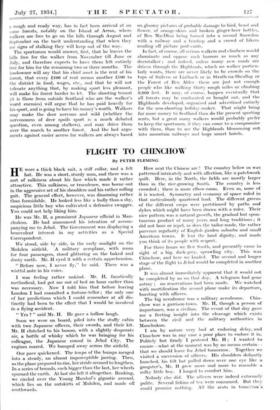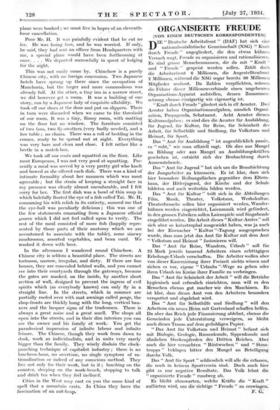FLIGHT TO CHINCHOW
By PETER FLEMING
E wore a thick black suit, a stiff collar, and a felt hat. He was a short, sturdy man, and there was a sort of sulkiness about his face which made it rather attractive. This sulkiness, or truculence, was borne out in the aggressive set of his shoulders and his rather rolling gait. The general effect, however, 'was disarming rather than formidable. He looked less like a bully than a shy, suspicious little boy who cultivated a defensive swagger. You could not help liking him.
He was Mr. H, a prominent Japanese official in Man- chukuo. He had announced his intention of accom- panying me to Jehol. The Government was displaying a benevolent interest in my activities as a Special Correspondent.
We stood, side by side, in the early sunlight on the Mukden airfield. A military aeroplane, with room for four passengers, stood glittering on the baked and dusty earth. Mr. H eyed it with a certain apprehension.
" Before now, I never fly," he said. There was a wistful note in his voice.
I was feeling rather unkind. Mr. H, fanatically methodical, had got me out of bed an hour earlier than was necessary. Now I told him that before leaving London I had consulted a fortune-teller ; the only one of her predictions which I could remember at all dis- tinctly had been to the effect that I would be involved in a flying accident.
" Yes ? " said Mr. H. He gave a hollow laugh.
Soon we were on board, piled into the stuffy cabin with two Japanese officers, their swords, and their kit; Mr. H clutched to his bosom, with a slightly desperate air, a bottle of whisky which he was bringing for his colleague, the Japanese consul in Jehol City. The engines roared. We bumped away across the airfield.
Our pace quickened. The tempo of the bumps merged into a steady, an almost imperceptible jarring. Then, as the plane prepared to rise, her stride seemed to lengthen. In a series of bounds, each bigger than the last, her wheels spurned the earth. At last she left it altogether. Banking, we circled over the Young Marshal's gigantic arsenal, which lies on the outskirts of Mukden, and made off southwards. How neat the Chinese are ! The country below us was patterned intricately and with affection, like a patchwork quilt. Here, in the North, the fields are mostly larger than in the rice-growing South. The country is less crowded ; there is more elbow-room. Even so, none of it is wasted. Symmetry and economy of space ruled in that meticulously quartered land. The different greens of the different crops were partitioned by paths and dykes which might have been drawn with a ruler. Their nice pattern was a natural growth, the gradual but spon- taneous product of many years and long traditions ; it did not bore or repel, as does the tailor-made, the rather parvenu regularity of English garden suburbs and small American towns. It lent the land dignity, and made you think of its people with respect.
For three hours we flew South, and presently came in sight of a big, dark-grey, sprawling city. This was Chinchow, and here we landed. The second and longer stage of the flight to Jehol would be completed in another plane.
It was almost immediately apparent that it would not be completed by us on that day. A telegram had gone astray ; no reservations had been made. We watched with mortification the second plane make its departure, bursting with officers.
The big aerodrome was a military aerodrome. Chin- chow was a garrison-town. Mr. H, though a person of importance, was a civilian. The event of that day gave me a fleeting insight into the cleavage which exists between the civil and the military authorities in Manchukuo.
I am by nature very bad at enduring delay, and Chinchow was in any case a poor place to endure it in. Politely but firmly I pestered Mr. H ; I wanted to ensure—what at the moment was by no means certain— that we should leave for Jehol tomorrow. Together we visited a succession of officers. His shoulders defiantly hunched, his felt hat pulled down over one eye like a gangster's, Mr. H grew more and more to resemble a sulky little boy. I longed to comfort him.
Nobody else did. The officers were indeed extremely polite. Several firkins of tea were consumed. But they could promise nothing. All the seats in tomezz9w's plane were booked ; we must live in hopes of an eleventh- hour cancellation.
Poor Mr. H. It was painfully evident that he cut no ice. He was losing face, and he was worried. If only, he said, they had sent an officer from Headquarters with me, a special plane would have been forthcoming at once. . . . We departed sorrowfully in quest of lodging for the night.
This was not easily come by. Chinchow is a purely Chinese city, with no foreign concession. Two Japanese hotels have sprung up there since the occupation of Manchuria, but the larger and more commodious was already full. At the other, a tiny inn in a narrow street, we did however get a room. It was a building of one story, run by a Japanese lady of exquisite affability. We took off our shoes at the door and put on slippers. Thege in turn were discarded when we came to the threshold of our room. It was a tiny, flimsy room, with matting on the floor but no window. The furniture consisted of two fans, two fly-swatters. (very badly needed), and a low table ; no chairs. There was a roll of bedding in the corner, ready to be spread out at night. Everything was very bare and clean and close. felt rather like a beetle in a match-box. - - We took off our coats and squatted on the flOor. Like most Europeans, I was not very good at squatting, Pre- sently a meal was served by a very pretty girl who knelt and bowed as she offered each dish. There was a kind of intimate formality about her manners which was most agreeable ; but the strain of keeping a straight face in my presence was clearly almost unendurable, and I felt sorry for her. The first dish was a bowl of thin soup in which balefully floated the eye of a fish called Tai. Mr. H, consuming his with relish in its entirety, assured me that the eye-ball was peculiarly delicious ; this was one of the few statements emanating from a Japanese official source which I did not feel called upon to verify. The rest of the meal consisted of more fish (happily repre- sented by those parts of their anatomy which we are accustomed to associate with the table), some sinewy mushrooms, assorted vegetables, and bean curd. We washed it down with beer.
In the afternoon I wandered round Chinchow. A Chinese city is seldom a beautiful place. The streets are tortuous, narrow, irregular, and dirty. If there are fine houses, they are concealed behind walls, and you cannot see into their courtyards through the gateways, because the gates are masked, on the inside, by another short section of wall, designed to prevent the ingress of evil spirits which (as everybody knows) can only fly in a straight line. In the streets, which in summer are partially roofed over with mat awnings called pengs, the shop-fronts are thickly hung with the long, vertical ban- ners and the lacquer signs of the tradesmen. There is always a great noise and a great' smell. The shops all open into the streets, and in their dim interiors you can see the owner and his family "at work: Irdu get the paradoxical impression of infinite labour and infinite leisure. The Chinese, though their, work from dawn to dusk, work as individualists, and in units very rarely bigger than the family. They wisely disdain the clock- punching technique of capitalist industry ; there is no luncheon-hour, no overtime, no single symptom of ra- tionalization or indeed of any conscious method. They live not only for their work, but in it ; lunching on the coiinter, sleeping on the work-bench, stopping to talk and drink tea when they feel inclined: Cities in the West may cast on you the same kind of spell that a mountain casts. In China they have the fascination of an ant-heap.



































 Previous page
Previous page